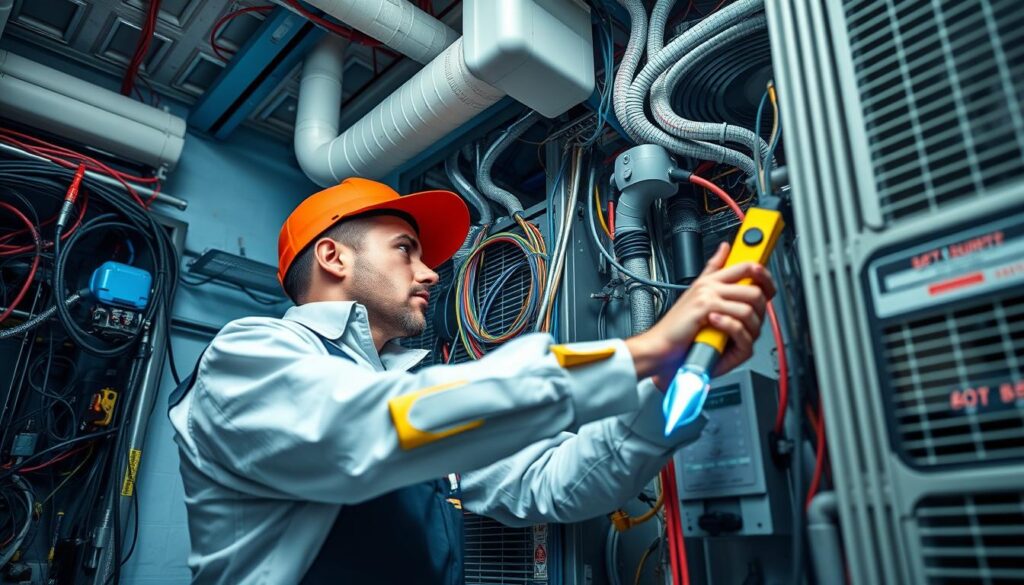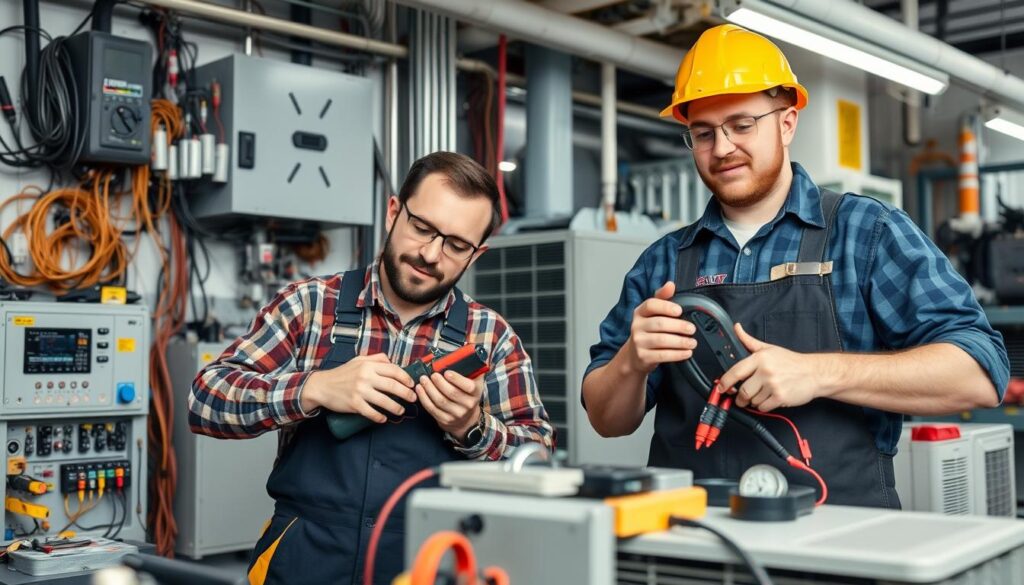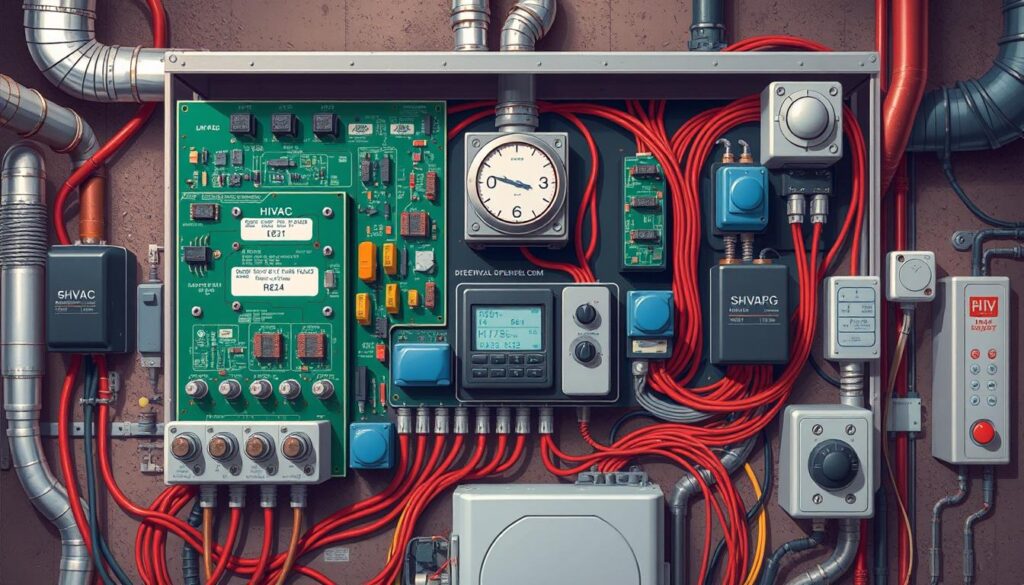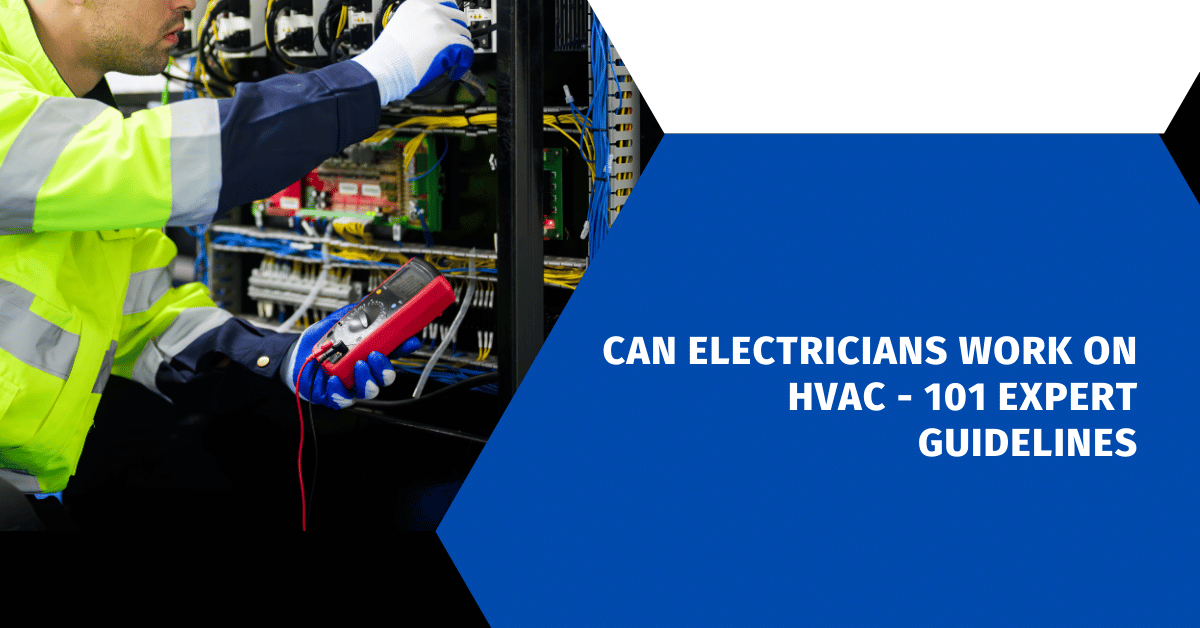Affiliate Disclosure
HVAC Guide Guys is a participant in the Amazon Services LLC Associates Program, an affiliate advertising program designed to provide a means for sites to earn advertising fees by advertising and linking to Amazon.
Can Electricians Work on HVAC? As the need for skilled, versatile workers grows, you might ask: Can electricians work on HVAC systems? The answer is a clear yes. Electricians are ready to tackle many tasks in the HVAC field, from electrical setups to upkeep. But what does this mean, and what should you consider?

Key Takeaways:
- Electricians have the skills and training to work on HVAC systems, especially on electrical parts like wiring and controls.
- By getting specialized HVAC training, electricians can do even more tasks.
- Electricians need the right licenses and certifications, like the EPA 608 for refrigerants, to work on HVAC systems.
- They must follow safety rules and standards to keep the equipment safe and working right.
- Learning HVAC skills can really help electricians by making them more attractive to customers and expanding their services.
Table of Contents
Understanding the Relationship Between Electrical and HVAC Work
HVAC systems need electrical parts to work. Knowing how HVAC and electrical systems work together is key. This knowledge helps in keeping these systems running smoothly.
Basic Principles of HVAC Systems
HVAC systems keep indoor spaces comfortable. They handle heating, cooling, and air flow. Components like compressors and fans help control temperature and air quality.
Electrical Components in HVAC Units
HVAC units have electrical parts like wiring and control systems. These parts power the unit and control its operation. They also check how well the system is working.
Integration of Both Trades
Working together, electricians and HVAC technicians make systems better. Electricians can fix electrical problems in HVAC units. HVAC techs can handle electrical parts better with some knowledge.
“The seamless integration of electrical and HVAC expertise is essential for ensuring the optimal performance and longevity of these complex systems.”
Explore Our HVAC Shop
Looking for top-rated HVAC tools, parts, and accessories? Visit our shop and find the perfect solution for your needs.
Visit the ShopLegal Requirements and Licensing Considerations
Electricians need to know the regulatory requirements and certifications for HVAC work. The rules for HVAC licensing differ by state. Some states let electricians do HVAC work, while others require a special HVAC certification.
In Alabama, HVAC contractors need an apprenticeship certificate or 3,000 hours of work experience. Alaska has different HVAC categories under the Mechanical Administrator license. Each category has its own experience needs, like journeyman experience or a degree in mechanical engineering.
The regulatory requirements for HVAC contractors vary across the country. In Arizona, you need four years of HVAC experience or two years plus a course or apprenticeship. Arkansas has five HVAC/R contractor licenses, requiring two years of experience or being an employee of a contractor.
It’s important for electricians to keep up with HVAC licensing and electrical certification rules. Knowing the local regulatory requirements helps ensure you follow the rules. This also makes working with the HVAC trade easier.
Can Electricians Work on HVAC: Scope and Limitations
In the world of HVAC and electrical work, the lines can blur. Electricians are great at wiring and fixing electrical problems. But, they can’t do everything in HVAC systems.
Permitted HVAC Tasks for Electricians
Electricians can do many HVAC tasks. For example:
- They can wire the electrical parts in HVAC units, like thermostats and motors.
- They can fix electrical problems in HVAC systems, like bad wiring.
- They can install and keep up the electrical connections for HVAC equipment.
Areas Requiring Specialized HVAC Certification
But, some HVAC tasks need special training. For example, working with refrigerants needs an EPA 608 certification. Also, complex HVAC installations need HVAC-specific training.
| Task | Electrician Scope | Specialized HVAC Certification Required |
|---|---|---|
| Wiring electrical components | Yes | No |
| Troubleshooting electrical issues | Yes | No |
| Handling refrigerants | No | Yes (EPA 608 certification) |
| Complex HVAC system integration | Limited | Yes (HVAC-specific training and credentials) |
The work electricians can do in HVAC changes by state and local rules. It’s important to know the latest rules and requirements.
Explore Our HVAC Shop
Looking for top-rated HVAC tools, parts, and accessories? Visit our shop and find the perfect solution for your needs.
Visit the ShopEssential Skills and Knowledge Requirements
To work well on HVAC systems, electricians need both electrical skills and HVAC knowledge. This mix is key to mastering the job.
They must grasp the basics of refrigeration, airflow, heating, and cooling. Knowing about different HVAC systems, like split and ductless, is important. They also need to be good at reading HVAC wiring diagrams.
Good communication and problem-solving skills are also crucial. Electricians should be able to explain complex issues to clients and work well with others. They must be able to find and fix electrical problems in HVAC systems.
Electricians should always keep learning. Keeping up with new technologies and rules is vital. It helps them stay competitive and offer top-notch services.
| Essential Skills | Required HVAC Knowledge |
|---|---|
|
|
By combining their electrical skills and HVAC knowledge, electricians can handle a variety of HVAC systems. They offer full services to their clients.

Training and Certification Pathways
To become an HVAC technician, you need a lot of training and special certifications. If you’re an electrician, you can learn more about HVAC systems. There are many ways to get the education you need.
Required Educational Background
First, electricians usually do an apprenticeship and pass a state test. For HVAC, you might need an EPA 608 certification. Some schools offer programs that teach both electrical and HVAC skills in just 10 months.
Specialized HVAC Certifications
- NATE (North American Technician Excellence) Certification: It’s the biggest nonprofit group for HVACR techs. It shows you know your stuff and can do the job.
- Section 608 Technician Certification: This is for those who work with refrigerants. It makes sure you follow EPA rules.
- R-410A Certification: This is for handling and fixing R-410A refrigerant. It’s used a lot in today’s HVAC systems.
Continuing Education Requirements
Keeping your certifications up and learning new things is key for HVAC techs. There are many ways to keep your skills sharp. You can take classes, go to workshops, or learn online.
| Training Program | Duration | Certification |
|---|---|---|
| Trade School HVAC Program | Less than 2 years | HVAC Technician Certificate |
| Community College HVAC Program | 2 years | Associate Degree in HVAC |
| Vocational HVAC Training | Less than 1 year | HVAC Technician Certificate |
| HVAC Apprenticeship Program | 3-5 years | Journeyman HVAC Technician |
By getting the right training and certifications, electricians can grow their careers. They can help the HVAC industry grow too.
Explore Our HVAC Shop
Looking for top-rated HVAC tools, parts, and accessories? Visit our shop and find the perfect solution for your needs.
Visit the ShopCommon HVAC Electrical Components and Systems
HVAC systems are complex and need many electrical parts to work well. As an electrician, knowing these parts is key. It helps in installing or fixing HVAC systems.
The main parts include wiring, circuits, control systems, thermostats, motors, and compressors. These parts work together. They power and control heating, cooling, and air flow in buildings or homes.
- Wiring: HVAC systems need lots of wiring for power and signals. Electricians must check wire size, circuit protection, and follow codes.
- Control Systems: These systems, like smart thermostats, control temperature and humidity. They often connect with building automation systems.
- Motors: HVAC units use motors for the compressor, fans, and blowers. These are key for air flow and temperature control.
- Compressors: The compressor is vital for the cooling cycle. It pressurizes and moves refrigerant through the system.
Knowing how these HVAC electrical components work is crucial. It helps electricians fix, maintain, and upgrade HVAC systems.
| HVAC Electrical Component | Function |
|---|---|
| Wiring | Distributes power and signals throughout the HVAC system |
| Control Systems | Regulates temperature, humidity, and other environmental factors |
| Motors | Powers the compressor, fans, and blowers for air circulation |
| Compressors | Pressurizes and circulates the refrigerant, essential for the cooling cycle |
By knowing these HVAC electrical components, electricians can do better work. They can handle HVAC tasks more effectively.

“Understanding the electrical components of an HVAC system is crucial for electricians to provide comprehensive services and ensure the system’s optimal performance.”
Safety Protocols and Best Practices
Keeping electrical and HVAC systems safe is key in the industry. Electrical safety rules are vital when working with live circuits. This means using the right handling techniques, protective gear, and following industry standards.
HVAC safety involves careful handling of refrigerants. It also means being aware of dangers from heating and cooling systems.
Electrical Safety Guidelines
Electrical accidents in the U.S. cause about 1,000 deaths and 30,000 injuries each year. It’s crucial to have the right training and qualifications for hazardous electrical work. Technicians should follow safety steps like using voltage testers right, turning off electrical gear, and making sure tools are grounded.
- Maintain a safe distance from live electrical wires
- Wear insulated gloves, hard hats, and ocular protection
- Inspect electrical cords for external defects before use
- Prepare for extreme weather conditions when working
HVAC-Specific Safety Measures
Bad HVAC work can cause electrical fires, power surges, and damage. Technicians need to alert owners to keep systems off and wear protective gear. They should also use insulated tools for safety.
It’s important to handle pressurized gas cylinders and chemicals safely. This prevents explosive hazards and health problems.
- Use factory-approved replacement parts for servicing HVAC equipment
- Avoid improvisation during jobs to maintain safety and service quality
- Implement best practice procedures to eliminate job site injuries
- Wear flame-retardant gear and respiratory protection when necessary
By following electrical and HVAC safety rules, technicians can keep themselves, their customers, and the systems they work on safe. It’s vital to stay trained and qualified for safe and successful HVAC work.
Cross-Training Benefits for Electricians
As an electrician, learning about HVAC can lead to new career advancement chances. By mastering heating, ventilation, and air conditioning, you become more versatile. This means you can offer more expanded services to your clients. This skill set makes you stand out and prepares you for success in facilities maintenance.
LinkedIn’s 2023 Workplace Learning Report shows that learning is key to keeping talent. By getting trained in HVAC, you show you’re serious about growing professionally. This makes you a valuable asset to your employers or clients.
More cross-training means happier and more engaged building engineers. It can also lower turnover rates and keep skilled workers. Plus, it makes them more productive and efficient, allowing them to handle more tasks and finish projects quicker.
Building engineers who cross-train become more flexible and adaptable. They can handle changes in the workplace better. Cross-training also boosts teamwork and communication, creating a stronger team spirit.
By diving into HVAC cross-training, electricians can set themselves up for long-term success. They’ll have better career advancement chances and offer more versatile and expanded services. This investment in yourself helps you grow and contributes to the success of the facilities maintenance industry.
Explore Our HVAC Shop
Looking for top-rated HVAC tools, parts, and accessories? Visit our shop and find the perfect solution for your needs.
Visit the ShopTroubleshooting Electrical Issues in HVAC Systems
As an electrician, you are key in fixing electrical problems in HVAC systems. These issues can cause energy waste, system failures, and safety risks. Knowing common electrical problems and how to diagnose them helps ensure HVAC systems work well and safely.
Common Electrical Problems
Common electrical issues in HVAC systems include faulty wiring, blown fuses, and broken thermostats. Bad wiring can make the HVAC unit cycle on and off too much, wasting energy. If circuit breakers keep tripping, it means there’s a problem with the system’s electrical parts that needs fixing fast.
Also, strange smells like melting plastic or burning rubber can mean serious electrical problems. Trying to fix these issues yourself can damage the system more and even cause fires. This shows why it’s crucial to get professional HVAC electrical diagnostics services.
Diagnostic Procedures
- Use special tools like multimeters and voltage testers to check the HVAC system’s electrical health.
- Follow the manufacturer’s instructions to find and fix electrical problems step by step.
- Look at wiring connections, check for loose or corroded terminals, and make sure grounding is right to keep HVAC troubleshooting effective.
- Do diagnostic tests on parts like motors, capacitors, and control boards to find what’s not working right.
- Work with HVAC technicians to fully understand the system’s system maintenance needs and electrical setup.
With your electrical skills and following best practices, you can find and fix HVAC electrical problems. This makes the system work better and keeps your clients safe.
Industry Regulations and Compliance Standards
Electricians working on HVAC systems must follow many rules. These rules ensure their work is safe, efficient, and legal. It’s important for them to keep up with HVAC regulations, electrical codes, and industry standards.
The ASHRAE/ANSI Standard 90.1 sets energy efficiency standards for HVAC. The International Energy Conservation Code (IECC) promotes energy-efficient HVAC in homes. The Uniform Mechanical Code (UMC) regulates HVAC system design and installation for safety and reliability.
Electricians must also follow the National Electrical Code (NEC) for HVAC work. This code gives guidelines for safe electrical installation and maintenance. Local building codes also play a big role in ensuring HVAC systems are safe and comfortable for users.
Electricians also need to know OSHA regulations. OSHA rules cover safety in handling hazardous materials and operating machinery. Following these standards protects both the technicians and their customers.
By keeping up with HVAC regulations, electrical codes, and industry standards, electricians can work safely and efficiently. This ensures the well-being of everyone involved and improves the quality of their services.
| Regulation/Standard | Key Requirements |
|---|---|
| ASHRAE/ANSI Standard 90.1 | Minimum standards for HVAC energy efficiency |
| International Energy Conservation Code (IECC) | Energy efficiency requirements for residential HVAC systems |
| Uniform Mechanical Code (UMC) | Regulations for HVAC system design and installation |
| National Electrical Code (NEC) | Guidelines for safe HVAC electrical installation and maintenance |
| OSHA Regulations | Safety protocols for HVAC-related work, including hazardous materials and machinery operation |
Following these regulations is key for electricians working on HVAC systems. By understanding the latest requirements, they can ensure their work is safe, efficient, and legal.
Explore Our HVAC Shop
Looking for top-rated HVAC tools, parts, and accessories? Visit our shop and find the perfect solution for your needs.
Visit the ShopTools and Equipment Requirements
As an electrician working on HVAC systems, you’ll need both standard electrical tools and specialized HVAC equipment. It’s important to use and maintain these tools well. This is key for effective troubleshooting, repair, and installation.
Essential Electrical Tools
For HVAC work, you’ll need a multimeter, wire strippers, pliers, and screwdrivers. Multimeters, which cost between $30 to $200, are vital for safely checking voltage, current, and resistance. Wire strippers, priced from $15 to $70, help you strip and prepare wires for connections.
Pliers, ranging from $15 to $70, are used for gripping, bending, and cutting wires. Screwdrivers, costing $10 to $70, are needed for assembling and disassembling HVAC components.
Specialized HVAC Equipment
- Refrigerant gauges ($40 to $100) for measuring refrigerant pressures
- Coil fin straighteners ($10 to $80) for maintaining HVAC system efficiency
- Digital thermometers ($10 to $80) for diagnosing temperature-related issues
- Reciprocating saws ($30 to $200) for cutting through ductwork and piping
- Refrigerant recovery machines ($15 to $100) for environmentally-responsible system maintenance
You’ll also need personal protective equipment (PPE) like safety goggles ($15 to $30), gloves ($15 to $30), and steel-toe work boots ($70 to $100). This is to keep you safe while working on HVAC systems.
The cost of these tools and equipment can vary a lot. It depends on the brand, features, and quality. Some HVAC companies may give you a basic set of tools. Others might expect you to buy your own.
Investing in reliable, high-quality tools is important. It ensures your HVAC work is efficient and safe.
Conclusion
Electricians can work on HVAC systems with the right training and safety steps. The trend of cross-skilled professionals opens up new career paths. This trend brings both growth and flexibility to the job market.
To work on HVAC systems, electricians need to know electrical theory and wiring. They must also understand circuits and voltage. Reading blueprints and following OSHA’s HVAC safety standards are crucial. Specialized HVAC training and certifications boost their value in the construction industry.
Electricians and HVAC technicians have similar salary ranges, but both trades offer good growth and job security. The construction industry faces a talent shortage, making skilled workers in HVAC and electrical highly sought after. By staying updated and prioritizing safety, you can become a key player in these fields.

